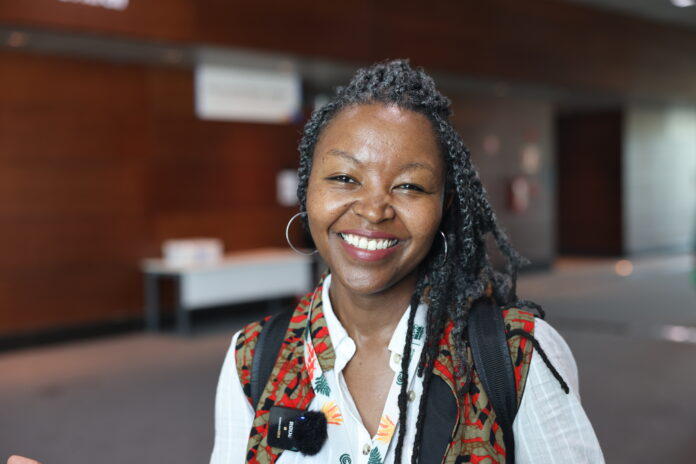The humid air of the Amazon hangs heavy as dusk settles over the sprawling city of Belem, a world away from the familiar heat of her native Kenya.
Yet for Emily Wanja Nderitu, the setting feels familiar in another way, for it is once again a frontline in the global climate struggle, a place where stories must be told if justice is to be won.
Nderitu, who works with Doc Society, a global organisation supporting independent storytellers, believes that Africa’s climate narrative must be reclaimed from the margins.
“COP is an event. Climate is not an event,” she said with the calm assurance of someone who has spent years watching headlines fade faster than droughts end.
In the crowded halls of global climate diplomacy, where promises are often made and just as often broken, Nderitu is part of a vital, growing contingent of young African change-makers who ensure the continent’s narratives do not die down in global discourse. Her weapon: film!
Telling the African story
For nearly a decade, Nderitu has been trying to change how the world talks about the planet’s crisis — and who gets to tell that story.
As an impact producer at Doc Society, she works behind the scenes, connecting filmmakers, activists, and cultural institutions across Africa to help them build stories that don’t just stir emotion but move policy, shift power, and stay in communities long after the cameras leave.
Her work revolves around two initiatives — the Democracy Story Unit and the Climate Story Labs — both designed to fuse art, science, and politics. “We bring together storytellers, scientists, and policymakers to ask: what are the stories we need right now, in this place?” she explained. “And how do we make sure those stories live beyond the screen — that they create real impact?”
It’s an unconventional approach in a world that often treats climate communication as a technical affair. But Nderitu’s lens is deeply human and unapologetically African.
Storytelling the missing piece of jigsaw puzzle
She first stepped into the field in 2016 as the impact producer for Thank You for the Rain, an award-winning documentary following Kenyan farmer Kisilu Musya as he transformed from a struggling grower into a climate campaigner. “That film changed me,” she recalled. “It made me realise storytelling could be the missing piece…the bridge between lived experience and global policy.”
Since then, she’s worked with filmmakers across the continent to spotlight what she calls the wisdom in the everyday. “In Africa, we don’t always say ‘climate change.’ We talk about delayed rains, the cows, and the crops. Climate is part of our daily conversation…part of who we are.”
That intimacy with the land, she says, is Africa’s secret weapon in the climate fight — but one the world rarely listens to. “Nature is not out there; it’s intertwined with how we live, how we farm, how we pray,” she said. “Our rituals, our seasons, our songs — they all tell you how deeply connected we are.”
For Nderitu, the task isn’t to romanticise ancestral knowledge but to modernise how it’s valued.
Science versus survival
“We have generations of wisdom on how to adapt — on when to plant, how to share water, how to rebuild after loss. But when global platforms talk about ‘solutions,’ they often ignore that. They speak science; we speak survival.”
She believes African voices must shape the climate narrative not just as witnesses but as strategists. “We need to tell our stories in our own way — through our realities, our languages, our humour, even our pain,” she said. “And then we need to show the world what our vision for the future actually looks like.”
That conviction drives the Climate Story Labs she helps run across the continent. Part creative incubator, part movement-building experiment, the labs bring together everyone from scientists to poets to local chiefs. “We treat stories as living organisms,” Nderitu explained.
She recounts moments where storytelling has already led to change. A film screening on land rights in Kenya sparked a town hall that pushed local leaders to revise an outdated water policy. In South Africa, a community photo project on drought inspired a new school garden programme. None of these made international news, but they mattered.
“Impact doesn’t have to trend,” she said. “It just has to work.”
The real work begins after COP
That quiet philosophy sets her apart from the noise that surrounds global climate conversations, especially the performative chaos of COP meetings. “I respect the ambition, but if all we do is talk here, we’re missing the point. The real work begins after COP — in the fields, in the films, in the small rooms where people decide what to do next.”
For all its pledges, the world’s premier climate summit has yet to match the urgency felt in places like Machakos, Kilifi, or Karamoja, where the line between survival and loss is drawn by the next rainfall.
Still, Nderitu remains optimistic — and her optimism is infectious. “We’re not short of knowledge or courage in Africa,” she affirmed. “We’re short of recognition. Storytelling can fix that. It can close the gap between visibility and value.”
As COP30 unfolds, she and her colleagues are pushing for a new kind of climate diplomacy — one that begins not with targets but with truth. They envision a world where local stories shape global priorities, where a grandmother’s memory of past droughts is treated with the same respect as a scientist’s model of the future.
“If you want to change how people act, change what they believe,” she said. “And belief begins with story.”
In a conference dominated by numbers, Nderitu’s weapon of choice — empathy — feels almost radical. But in her world, it’s also the most pragmatic tool available. Stories, she insists, can make people care. And people who care, act.
© bird story agency



